How to Grow Herbs: A Beginner’s Guide
How to grow herbs in a home herb garden for beginners. Herbs are one of my favorite things to grow. They’re useful, beautiful, and often very easy to get started.

Maybe you’re fairly new to gardening and want to start off with something small, or possibly you’ve grown vegetables in a home garden and are now ready to try something new.
Either way, here are some helpful tips for how to grow herbs in a home herb garden.
Benefits of Growing Herbs
My husband and I love gardening, and have pretty much had a garden ever since we got married over 25 years ago.
(New to gardening? Here are some tips and resources for beginning gardeners.)
There are several great reasons to start a home herb garden. Here are just a few:
1. Herb Gardening is Simple
For one, growing herbs at home is in some ways simpler than growing vegetables such as tomatoes or cucumbers.
This is because herbs are generally less prone to diseases and insects than vegetables.
Although many herbs are like vegetables in that they are annuals (meaning they will only grow one year and not come back again), other herbs such as chives and rosemary are actually perennials and will grow back year after year.
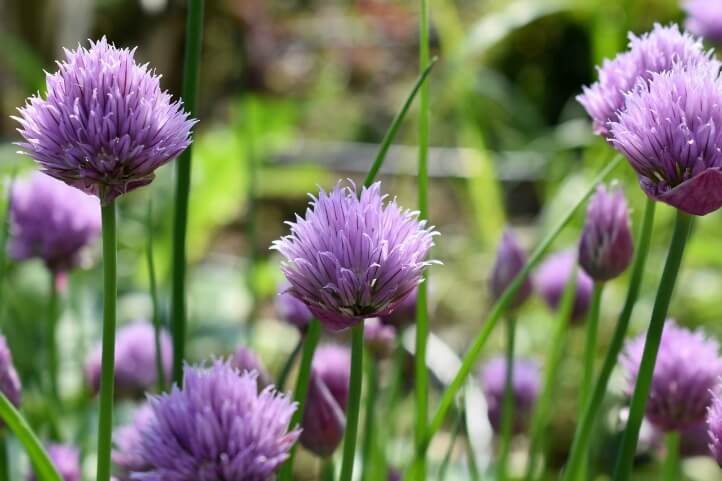
If your soil is not very rich, herbs are very forgiving, as they tend not to be as nutrient-hungry as vegetables and can often grow in soil where vegetables may not thrive.
While soil type is not as essential, you will want to keep young herbs well watered to encourage root growth and prevent drying out.
2. Herbs are Beautiful
One of the primary assets of herbs is that they’re beautiful (some of my favorites are lavender, sage, chamomile, and comfrey).
Herbs like lavender and bee balm produce gorgeous blooms that can attract butterflies and hummingbirds.
Other plants such as chamomile, thyme and rosemary have a lovely fragrance that fills the summer air with the pleasant scent of fresh herbs.
3. Herbs are Delicious
Herbs can greatly enhance the taste of your food.
Add a handful of fresh thyme or basil to pasta sauce. Make your own mint tea with peppermint or spearmint.
Sprinkle on some rosemary before roasting a chicken and let the fragrance waft through your kitchen.
Mint is easy to grow and makes a great tea. Learn how to make tea from fresh mint leaves here.
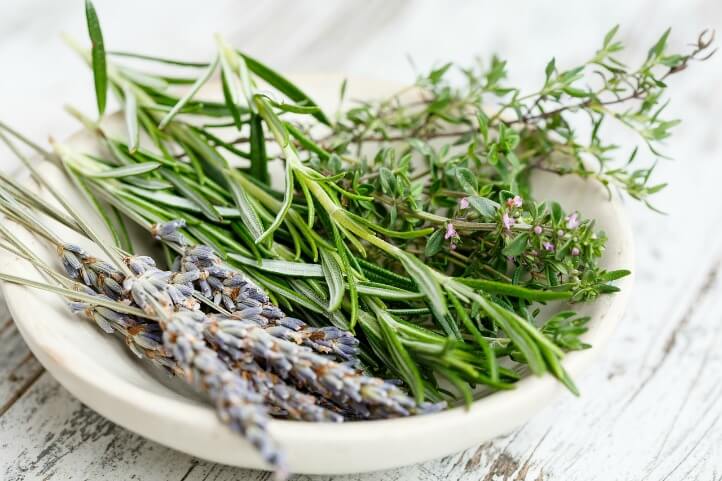
This post contains affiliate links, which means I may make a small commission at no extra cost to you. Read my disclosure here.
4. Herbs Have Health Benefits
One final benefit to having a home herb garden is that herbs can sometimes be used medicinally to treat a variety of health conditions.
Herbs are great for treating minor skin irritations or conditions like insomnia.
Got a bug bite? Rub some crushed lavender on it for quick relief.
Have a child with an upset tummy? Brew up a pot of fresh chamomile or peppermint tea to soothe your little one’s digestion. (This book is one of my all-time favorites for how to use medicinal herbs at home.)
Learn how to make your own homemade comfrey salve here.
How to Grow Herbs
When thinking about starting a home herb garden, there are several things you’ll need to take a look at. Here are a few tips for figuring out how to grow herbs at home.
First, how much space do you have? If you live in the city and only have a small space to devote to an herb garden, consider growing plants such as thyme, chives or basil that don’t take up a lot of room.
Just be aware that anything from the mint family (peppermint, spearmint, etc.) can be quite aggressive in terms of spreading beyond the area where you originally planted it.
Decide which herbs you want to plant, pick up some plants at a local greenhouse, and plant them in your chosen container!
I recommend buying plant starts, if possible. Starting herbs from seed can be done but may be challenging if you’re new to gardening.
If you’d like to use seeds, oregano and basil are usually easy to start from seed. Plants like lavender are a bit more difficult to start from seed.
You can have a natural pharmacy in your backyard! Get your medicinal garden kit here!
Try a Container Herb Garden
If you are really tight on space, you could grow herbs in something like stackable pots.
Many herbs will thrive in containers unless they have deep roots and need a lot of moisture. Arrange one or several pots on your back deck or patio and try your green thumb with some herbal favorites.
One advantage to containers is that you can move them around to sunnier (or less sunny) spots as needed, or even move them inside if frost threatens.
You can also plant your herbs in a raised bed. Here’s how to make your own raised garden beds.
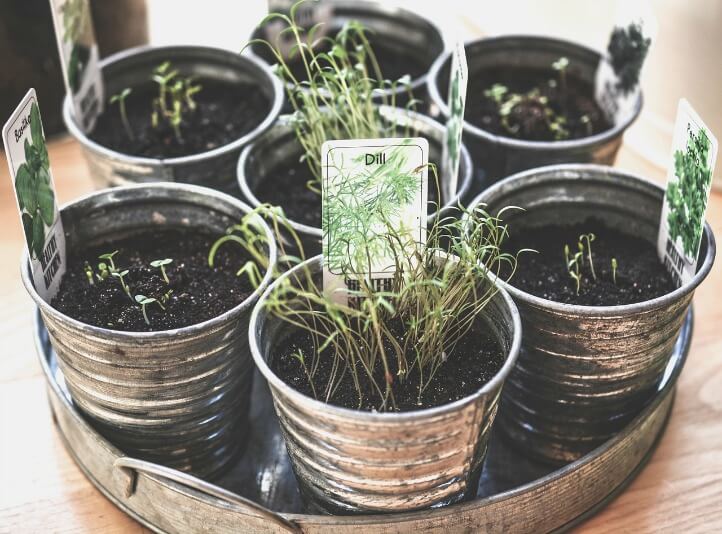
How to Grow Herbs in the Garden
Some people like to grow herbs in a separate area in their garden away from vegetables while others like to “companion plant” with herbs interspersed with veggies.
If you go the companion planting route, try growing tomatoes with chives to help repel pesky aphids. Plant dill with cucumbers to drive away aphids and spider mites.
Are you limited in not having open, sunny areas for growing? Parsley, mint and cilantro don’t require full sun and can do well in more shaded spots.
Be careful with mint in the garden, as it can overtake the whole garden! I like to plant my mint in a large tub or barrel to keep it contained.
I love making homemade mint tea with fresh mint leaves!
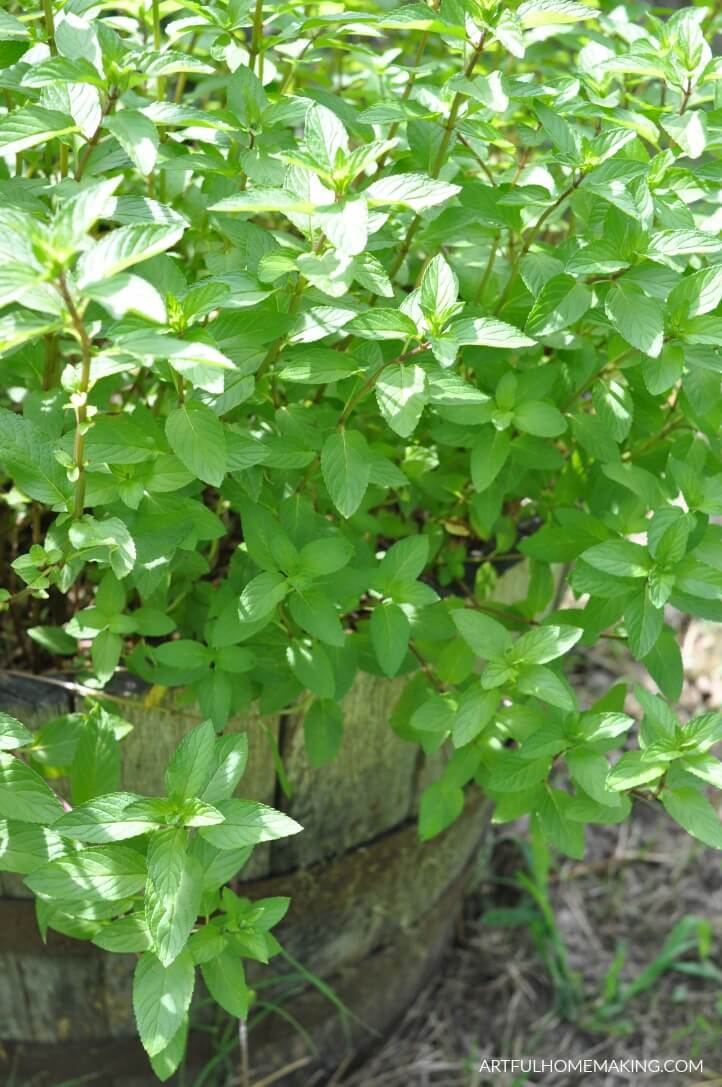
You may want to plant perennial herbs such as rosemary and chives together in one area of your herb garden, with annuals like basil and summer savory in another spot.
It can also be fun to create a “cottage garden” look by interspersing different types of herbs all in one location and then watching the gorgeous show of different and brightly colored flowers that results.
More Gardening Inspiration:
- How to Make Mint Tea with Fresh Mint Leaves
- How to Make Comfrey Salve
- 12 Tips for Growing Tomatoes
- Gardening for Beginners: The Ultimate Resource Guide
- Our Favorite Gardening Books to Learn How to Garden
- Where to Buy Heirloom Seeds for Your Garden
Which Herbs Should I Plant?
Try growing some culinary herbs like oregano and basil, as well as some medicinal herbs like chamomile and calendula (also known as pot marigold).
However, you will soon find there is a lot of overlap between culinary and medicinal herbs. For example, rosemary adds a delicious flavor to dishes but also has some amazing health benefits such as fighting inflammation!
The herb sage gets its name from the fact that it can actually help with memory and cognitive ability, and may even fight off dementia. It’s a great one to include in your garden!
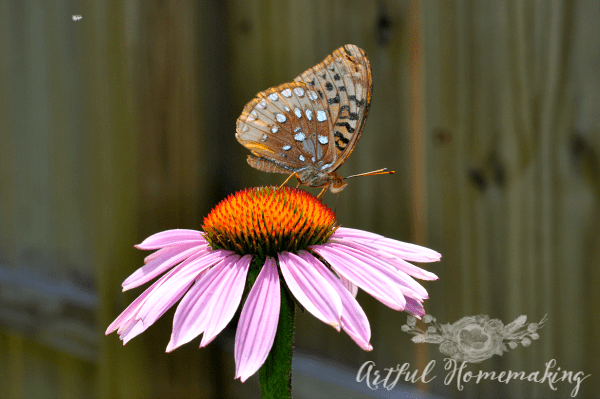
Here are some of my favorite herbs to have in the garden:
- Lavender
- Rosemary
- Chives
- Echinacea
- Sage
- Basil
- Oregano
- Mint
- Comfrey
- Catnip
- Chamomile
- Dill
- Lemon balm
- Parsley
- Thyme
You can have a natural pharmacy in your backyard! Get your medicinal garden kit here!
How to Preserve Your Herb Harvest
To preserve your harvest, you can dry herbs to use during the winter when fresh herbs are unavailable. While many herbs are suitable for drying, rosemary, sage and thyme are some of the easiest to preserve.
In addition to drying, you can also freeze the herbs, or use them to make salves, tinctures, or other herbal preparations.
Here are a couple of my favorite ways to use herbs:
How to Dry Herbs
To preserve your herbs, cut off a section you wish to keep, rinse lightly under cool water, and shake off excess moisture.
Use a rubber band to secure the herbs together, or tie up the bunch of herbs with string. Find a suitable dry and well-ventilated spot in your home for hanging the herbs.
Herbs can be hung on a rack, from clothes hangers, or any other suitable spot that is out of direct sunlight. Once dried you can use as any other dried herb.
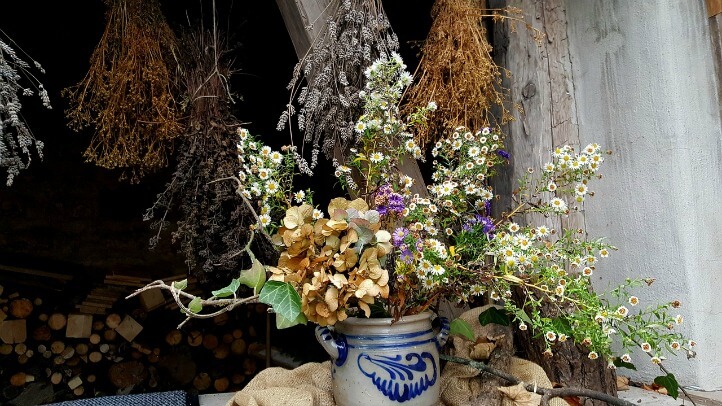
Grow Your Own Herbs
Growing herbs can provide many benefits in terms of beautifying your yard and garden, as well as providing delicious flavors and even promoting your family’s health.
If you already grow herbs, why not try a few new ones this year? If you’ve never grown herbs before, now is the perfect time to get started!
This book, Homegrown Herbs, is my favorite book about growing and using herbs, and I refer to it all the time. I highly recommend it!
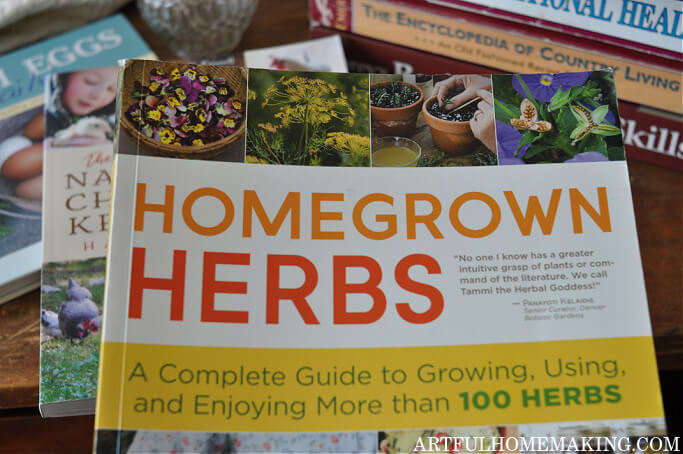
6 Simple Tips for Herb Gardening
To condense it down to the basics, here are 6 basic tips for how to grow herbs.
- Determine which herbs you want to plant. Some great ones to start with are basil, chives, or rosemary.
- Find a suitable location for planting, whether it be in a garden or in a container.
- Buy herb plants or start your own from seed (these are some of the best places to get heirloom seeds).
- Plant your herbs and keep them watered and weeded.
- Preserve the harvest by drying, freezing, etc.
- For more information, you may want to consult this herb book, as it’s my absolute favorite for learning how to grow and use herbs.
I hope these tips for how to grow herbs have been helpful! Thanks so much for stopping by!
You can have a natural pharmacy in your backyard! Get your medicinal garden kit here!
Pin This Post for Later:
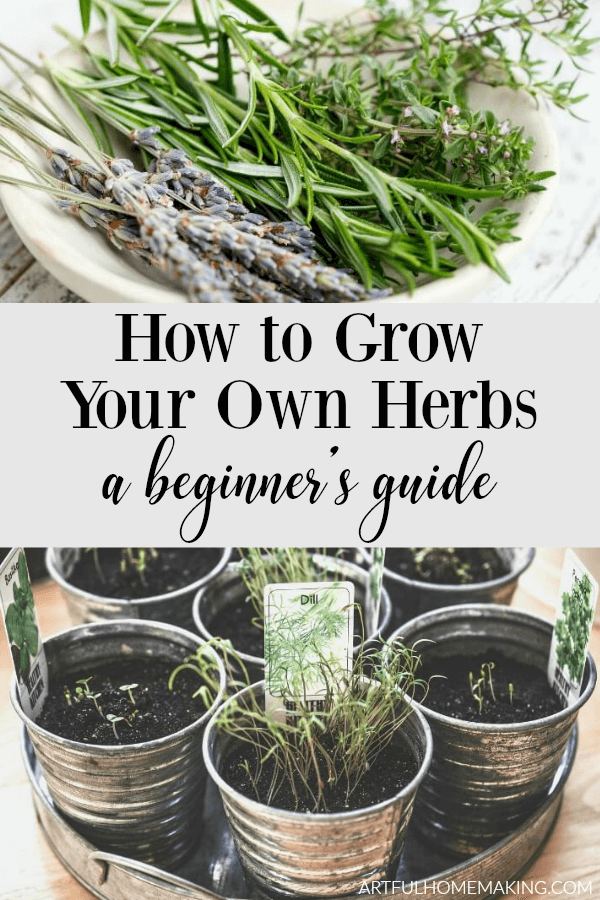
Related Post:
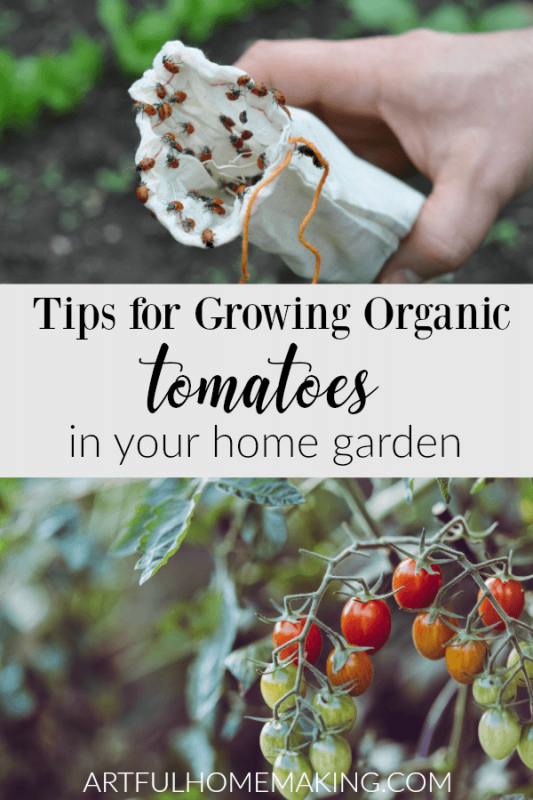

Joy, it’s so good to see you at Tuesday Turn About again! Hope you are doing well! Love this post about how to grow herbs. I’ve recently made a change in my diet and I’m using all organic produce, so this was a great post for me! I’m so happy to be featuring your post at this week’s party! Pinned!
Thank you so much, Julie!
I bought some herbs recently. Your post is very helpful
Thank you!
I will share this with our Son and DIL as they have a non-profit animal rescue farm and also starting to add herbs and lavender.
I visited you via Crafty Creators Link Party #67
If not already part of SSPS, and are interested, find my entries: 24+25
You will find the linkup information (1) In the Top bar under Blogging: Weekly Senior Salon Pit Stop (2) In the sidebar: Click on 2nd image; (3) under the “Recent Posts
We hope to meet you there virtually.
Thank you, Esme!
This is amazing. I would love it if you would share this on the Fabulous Friday Link Party this Friday. You can find the link on my website, Peacock Ridge Farm. Blessings to you.
Thank you, Renae!